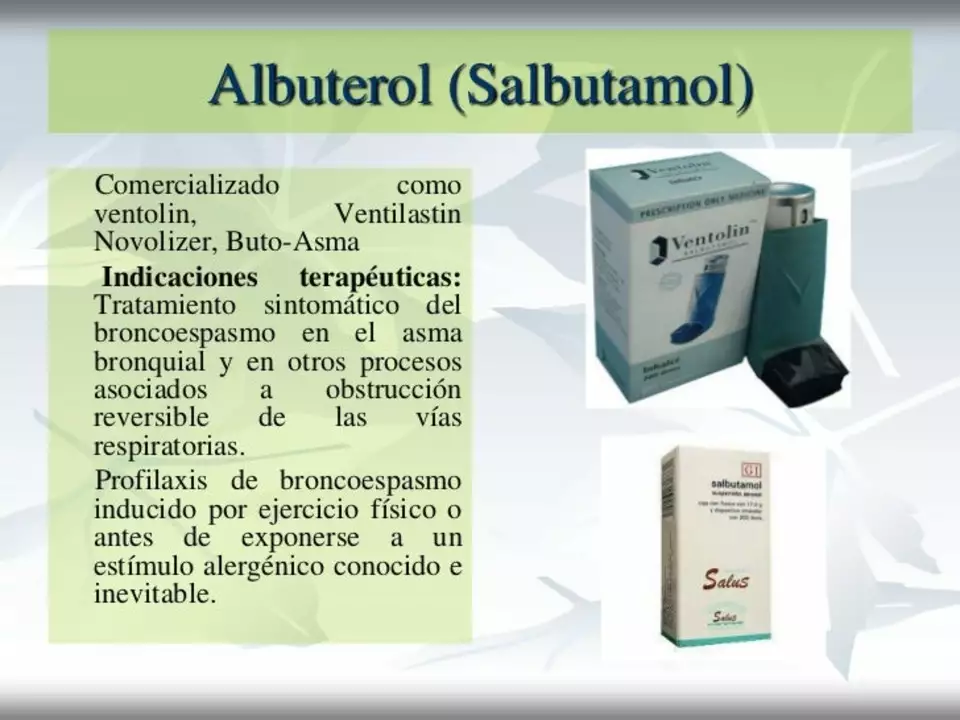Albuterol: What It Does and When to Use It
Albuterol is a fast-acting bronchodilator used to open airways during asthma attacks or sudden shortness of breath. You’ll see it sold as inhalers (ProAir, Ventolin, Proventil) and as a nebulizer solution. Think of it as a rescue medicine — it helps you breathe better quickly, not a daily controller for inflammation.
If you have asthma or COPD, your doctor may give albuterol for sudden symptoms or before exercise if you wheeze while active. It works within minutes, so you’ll notice relief fast. If your symptoms don’t improve after using it, treat that as a sign to get medical help.
How to Use Your Albuterol Inhaler
Using an inhaler correctly makes a big difference. For a pressurized metered-dose inhaler (MDI): shake the can, breathe out fully, put the mouthpiece in your mouth, press the can as you breathe in slowly, then hold your breath for about 10 seconds. If you’re told to take two puffs, wait about 60 seconds between puffs.
If you struggle with coordination, use a spacer — it holds the medicine so you can inhale it more easily. For nebulizers, the usual outpatient dose is 2.5 mg in saline over 5–15 minutes, but follow the exact instructions from your provider or the product label.
Typical rescue dosing is 1–2 puffs every 4–6 hours as needed. Don’t exceed limits set by your doctor. Frequent need for albuterol (more than twice a week for symptoms) means your controller therapy may need adjusting.
Side Effects, Precautions, and Buying Tips
Common side effects include shaking, a fast heart rate, nervousness, headache, and muscle cramps. These are usually temporary. If you feel chest pain, extreme fast heartbeat, or severe tremors, stop and seek care. Albuterol can lower potassium levels if used a lot, which matters if you’re on certain heart drugs.
Tell your provider about heart disease, high blood pressure, diabetes, or thyroid problems — albuterol can make these conditions harder to manage. Also mention any beta-blockers you take, since they can reduce albuterol’s effect. Ask your doctor before using it with MAO inhibitors or tricyclic antidepressants.
Buying albuterol: in many countries you need a prescription. If you shop online, pick pharmacies that require a prescription, show a license, and use secure checkout. Avoid sites selling big discounts without asking for a prescription — that’s a red flag. Store your inhaler at room temperature, keep the cap on, and check the expiry date and dose counter.
Bottom line: albuterol is a reliable fast-relief drug when used correctly. Learn how to use your device, watch for side effects, and talk to your doctor if you need it too often. That keeps you breathing easier and safer.
Albuterol and Pregnancy: Safety, Risks, and Recommendations
- Robin Tudge
- April 27, 2023
- 17 Comments
As a pregnant woman, I know it's crucial to be cautious about the medications I take. Albuterol, a common asthma medication, has been a topic of concern for many expecting mothers. From what I've learned, it appears to be relatively safe during pregnancy, but there might still be some risks involved. It's essential to consult with a healthcare professional before using albuterol to weigh the benefits and potential risks. Ultimately, the safety of both the mother and the baby should be the top priority when making any decision about medications during pregnancy.
read more
